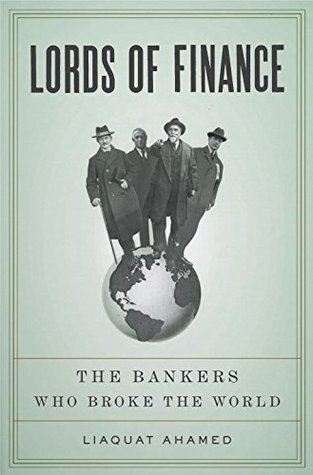
…in this book I maintain that the Great Depression was not some act of God or the result of some deep-rooted contradictions of capitalism but the direct result of a series of misjudgments by economic policy makers, some made back in the 1920s, others after the first crises set in – by any measure the most dramatic sequence of collective blunders ever made by financial officials.
Lords of Finance is a Pulitzer Prize-winning history of four central bankers who opened the gates to the Great Depression through a flurry of misguided and disastrous policies following the First World War. Liaquat Ahamed writes a blend of economic history and biography that follows the trajectories of Benjamin Strong, Montagu Norman, Émile Moreau, and Hjalmar Schacht – the central bankers of the United States, Great Britain, France, and Germany, respectively.
Ahamed depicts the bankers as brilliant men who make mistakes in economic policy due to their own hubris, pride, and uncertainty in an era where economic policy was driven less by knowledge and data, and more by intuition and power. Their mistakes would ultimately lead to the worst economic crisis that modern civilization has seen to date.
Ahamed wrote Lords of Finance based upon research he did as an investment manager. It’s fair to assume that his history is rooted within the mindset of liberal capitalism. He sees the the cause of the crisis as the deficiencies of men unable to understand the market, rather than any fundamental defects with the market and capitalism itself. It’s important to understand that his history is a critique of individuals, not of a system that enabled or forced these individuals to act.
He is fascinated by the movement of money, admires the fortunes of individuals and their displays of wealth, and wonders at the prestige and fame that bankers held at this point of history. No matter your ideology, his enthusiasm is captivating.
He has a knack for storytelling, placing vignettes and anecdotes throughout the book to make its otherwise dry subject matter readable. That being said, the book could have been significantly more concise if it has focused more on policy decisions and less on the biographies of the central bankers.
But that is part of the charm of Lords of Finance; it is a crossroads of economic history and biography. It has both a thought-provoking thesis explaining the causes of the Great Depression and entertaining stories to drop you in its historical context.
Analysis
In order to keep this review short, I have broken my analysis out into separate posts that I will update as I complete them:
- Part I: Introduction and WWI
- The Gold Standard (…upcoming)
- Going Off Gold (…upcoming)
- The Collapse (…upcoming)
Final Thoughts
I fundamentally disagree with the book’s thesis; the Great Depression was not the “direct result” of a series of costly and misguided mistakes made by flawed individuals. The concentration of power in the hands of a few central bankers – a system much closer to an aristocracy than a democracy – will inevitably lead to cycles of booms and busts as we confront new circumstances.
The Great Depression was the result of concentrating power into an aristocratic “elite.” Of course they made crucial mistakes – fixating on war debts, reparations, exchange rates, and a rigid gold standard – but the core issue here is that a system of governance should not be run by a select few choosing to preserve the financial world over the economic one.
Retrospectively, we can point fingers all we want saying that they “made mistakes.” We can believe that if they had the data we have today, they could have avoided catastrophe.
That is a fantasy world. We will confront an unending number of circumstances that we have never seen before. The dotcom bubble, the housing crisis, and the current COVID-19 crisis are all examples of this. After-the-fact, we may be able to trace causes of each crisis. But to say that they are the “direct result” of “blunders” is to miss the point.
That being said, by making his thesis clear upfront and tracing historical facts, Ahamed has produced a great book. It is deeply thought-provoking, fun to read, and incredibly relevant to today’s world. It might be a little too large for the casual reader, but if you are interested in economics and finance, this book will be right up your ally.